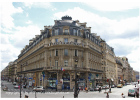Другие журналы

Kovalchuk
Disruption of synchronization in the tracking system with delayed pseudo noise signal
Engineering Education # 12, December 2012
DOI: 10.7463/1212.0496490
Engineering Education # 12, December 2012
DOI: 10.7463/1212.0496490
The author analyzes the mean time till failure of synchronization of the discrete phase-locked loop system (PLL) in order to optimize parameters of the filter in the ring of delay control for the longest possible synchronization mode. The optimal value of the system parameter and the maximum reachable mean time till failure of synchronization was determined. An expression for the mean time till failure of synchronism, which is resistant to any limiting transition leading to reduction of the order of the system (which does not occur for a number of other methods of calculation) was obtained. The results are compared with different types of PLL systems of the second order.
Cycle skip in discrete phase-lock system
Engineering Education # 10, October 2012
DOI: 10.7463/1012.0478399
Engineering Education # 10, October 2012
DOI: 10.7463/1012.0478399
The cycle skip phenomenon can have a significant impact on performance of phase-lock systems, it results in a sharp increase in frequency errors. The author analyzes the mean time till the skip of discrete phase-lock systems when interference in several ways is present. To study phase-lock systems the approximate Kramers formula and Zhuravlev formula for phase-lock systems with the integrating filter. The author compares characteristics of the average time for phase-lock systems of the 1st and 2nd order.
Effects on second order phase lock of harmonic interference and additive noise
Engineering Education # 09, September 2012
DOI: 10.7463/0912.0475444
Engineering Education # 09, September 2012
DOI: 10.7463/0912.0475444
The author analyzes statistical dynamics of continuous phase lock systems of second order in the presence of combined interventions. On the basis of the Markov unit of random processes (Fokker-Planck-Kolmogorov equation), by using various approximations, the author obtained statistical properties of the phase-locked loop of second order. In the first place, this is probability density (PD) of the error signal, frequency of skips, as well as the mean difference between the oscillations of the controlled oscillator and the signal at the input of the combined action of phase lock as an additive mixture of signal, the sum of several harmonic noises and Gaussian noise. The author provides a comparison of characteristics of the phase locks of the 1st and 2nd order.
Statistical characteristics of discrete systems of phase locking
Engineering Education # 08, August 2012
DOI: 10.7463/0812.0475421
Engineering Education # 08, August 2012
DOI: 10.7463/0812.0475421
This paper provides statistical characteristics of discrete systems of first-order phase locking in the absence of noise, in contrast to most other studies which consider deterministic systems. One of the main research methods is the method of Markov and semi-Markov random processes and circuits developed by A.N. Kolmogorov and L.S. Pontryagin. The theory of stochastic systems of phase locking first emerged in works by R.L. Stratonovich and V.I. Tikhonov. Among the phase locking systems the main focus is on continuous systems whereas statistical characteristics of discrete phase locking have been studied to a lesser extent, partly because of diversity of discrete systems. The author gives an analysis of stochastic discrete phase locking with sinusoidal characteristics of the detector. The results of exact and approximate methods were compared for the first time. As a result, the main statistical characteristics were obtained: probability density of phase mismatch in the stationary and nonstationary modes, time left till tracking loss in pulse phase systems.
77-30569/307193 Analysis of sigma-delta modulator
Engineering Education # 01, January 2012
Engineering Education # 01, January 2012
A sigma-delta modulator with negative feedback was considered in this article. The structure and working principles of devices built on the basis of sigma-delta modulation were presented. Application areas of the sigma-delta modulators were explored. Mathematical models of the sigma-delta modulator’s operation in the time domain were described. Analysis of operation of the sigma-delta modulator of the first and the second orders was also presented in the article. It was determined that a noise band appeared in the sigma-delta modulator because modulator was a chaotic attractor. Sigma-delta modulator’s ability to form the frequency fractionality in output spectrum was also indicated. Mathematical models without additive noise were considered; the conclusion on the influence of the modulator’s order on the noise level. The graphics, which displayed basic characteristics of sigma-delta modulator’s operation with different inputs were included.
Affecting system of synchronization of harmonic hindrances and noise
Engineering Education # 03, March 2011
УДК: 621.396.662
Engineering Education # 03, March 2011
УДК: 621.396.662
The article analyzes the synchronization system in the presence at its input in the form of the combined effect of the additive sum of the signal, harmonic interferences and noises in the form of a Gaussian random process. The model of the synchronization system in the form of a phase-locked loop as a structural scheme and the nonlinear stochastic control. The article offers the derivation of the differential equation. In the future, authors plan dispose of the noise component examine the deterministic control solution using the method of harmonic balance. As a result, the authors obtained a system of algebraic equations for the parameters of the approximate solutions. The article offers the image obtained parameters depending on the values of GPT. In the first case, increasing the noise intensity leads to improved matching, increases the mean time to failure of tracking and decreases the average value of the frequency mismatch; In the second case, the reverse trend.
| Authors |
| Press-releases |
| Library |
| Conferences |
| About Project |
| Phone: +7 (915) 336-07-65 (строго: среда; пятница c 11-00 до 17-00) |
|
||||
| © 2003-2024 «Наука и образование» Перепечатка материалов журнала без согласования с редакцией запрещена Phone: +7 (915) 336-07-65 (строго: среда; пятница c 11-00 до 17-00) | |||||



